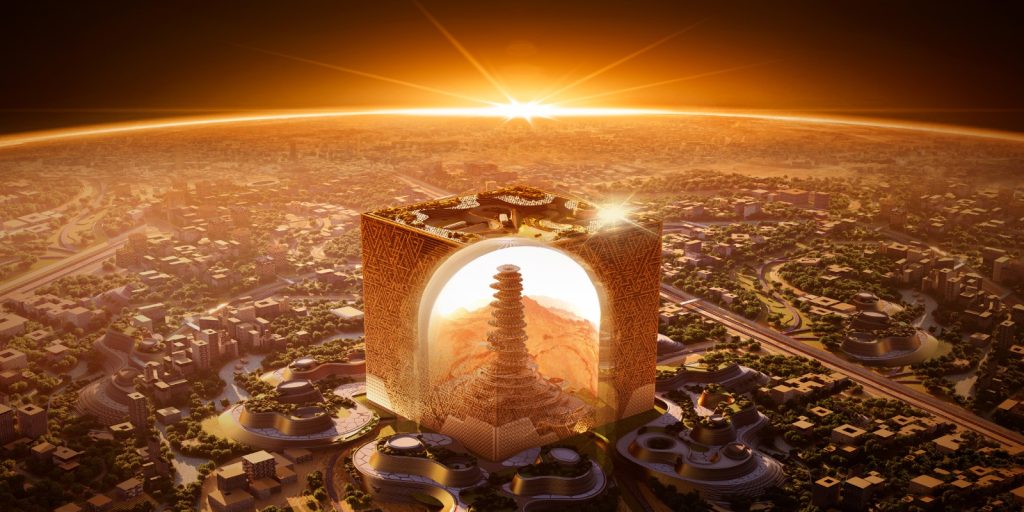Matthew Tribe, Managing Director, Planning, Design, and Engineering, Middle East & Africa at AtkinsRéalis dives into innovation in the construction industry
For almost seventy years, the construction industry remained unchanged from its industrial roots until about 15 years ago when the advent of digitalisation and increasing awareness about climate change forced the wider industry to reimagine itself with the sizeable and rapidly developing benefits of the digital age. As an outcome, the past decade has been one of the most exciting periods of development, not only in terms of what is possible but how projects are being delivered.
In the GCC, we are amid a fascinating metamorphosis, developing mega projects on a scale never seen before while redefining how we work. As an outcome, collaboration has become an early-stage requirement for most projects, a feat made possible through various digital tools and platforms that deliver high-performance design solutions for the built environment.
AtkinsRéalis, a leader in construction industry innovation, has revolutionized collaboration, departing from isolated workflows. This transformation has optimized design processes, improved stakeholder communication, reduced costs, spurred innovation, and ultimately, increased client satisfaction. Our hyper-collaborative approach ensures real-time communication, early contractor involvement, integrated workflows, and cutting-edge technologies for optimal project outcomes.

Recent advancements in technology are transforming our industry, with BIM, automation, and generative AI leading the way towards enhanced technical assurance and streamlined solutions during planning and design. Generative AI particularly shows promise in improving workflows, expediting ideation, and promoting data-driven design. However, it’s crucial to carefully evaluate AI’s applicability across the value chain and its practical implementation.
As a company fully committed to sustainable urban master planning, AtkinsRéalis’ work on Riyadh’s New Murabba and The Mukaab is not only the most challenging project to date but the embodiment of the human-centric design, where technology has been leveraged to deliver usability, functionality, and an integration with nature never before seen within an urban environment.
Set to become a “gateway to another world,” The New Murabba, supported by AtkinsRéalis, will be a human-first downtown, which includes access to greenery and amenities within five mins, with The Mukaab as the indisputable centrepiece. Comprised of a mixed-use megastructure of 400x400x400 metres, The Mukaab will become Riyadh’s tallest building and a global destination for immersive entertainment, hospitality, lifestyle, retail, culture, commercial and recreational activities.

Beyond its concept, scale, and ability to develop it in the most efficient way possible, we are arguably most proud of our project sustainability commitments. Our focus encompasses our material selection and understanding the project’s complete lifecycle – this means a 360-degree approach that includes the building’s operational emissions and how each element can be reduced as part of our wider industry journey to net zero. AtkinsRéalis’ commitment to sustainability is not just a buzzword, but a tangible effort to reduce our environmental footprint and contribute to a greener future.
As a result, AtkinsRéalis advocated for modern construction methods, including prefabrication and modularisation techniques that streamline project delivery. This has also significantly helped in logistical coordination, a fundamental requirement when building a city within an existing town. Additionally, the use of green materials can help minimise the environmental footprint.
Undoubtedly, the GCC’s leadership in the global construction industry is a result of the sheer volume of skilled and experienced professionals working in harmony to deliver a common goal. This, coupled with a regional leadership that embraces new technologies and upholds an unwavering commitment to creating high-quality, liveable urban environments, has led to a sea change in the industry. Open-source sharing, enhanced transparency, and extensive collaboration foster climate-resilient designs, delivering community-centric projects while honoring nature. GCC’s leadership isn’t just a title; it propels industry change, fostering innovation and sustainability.




